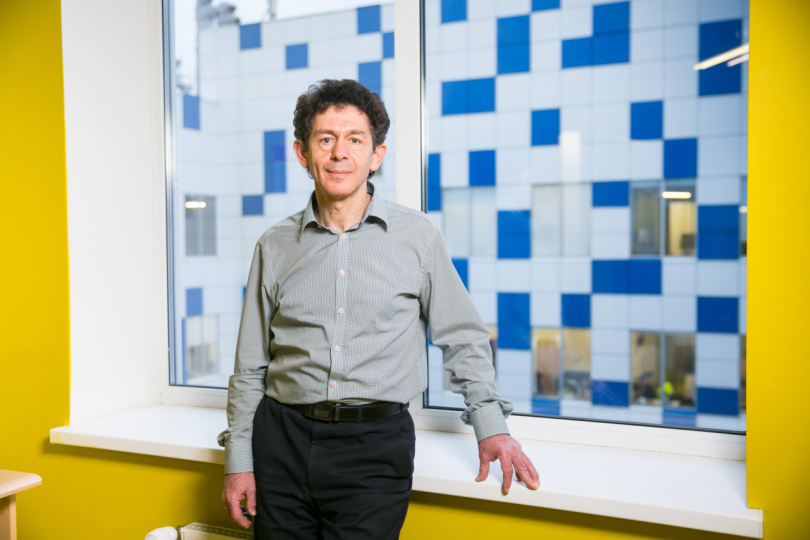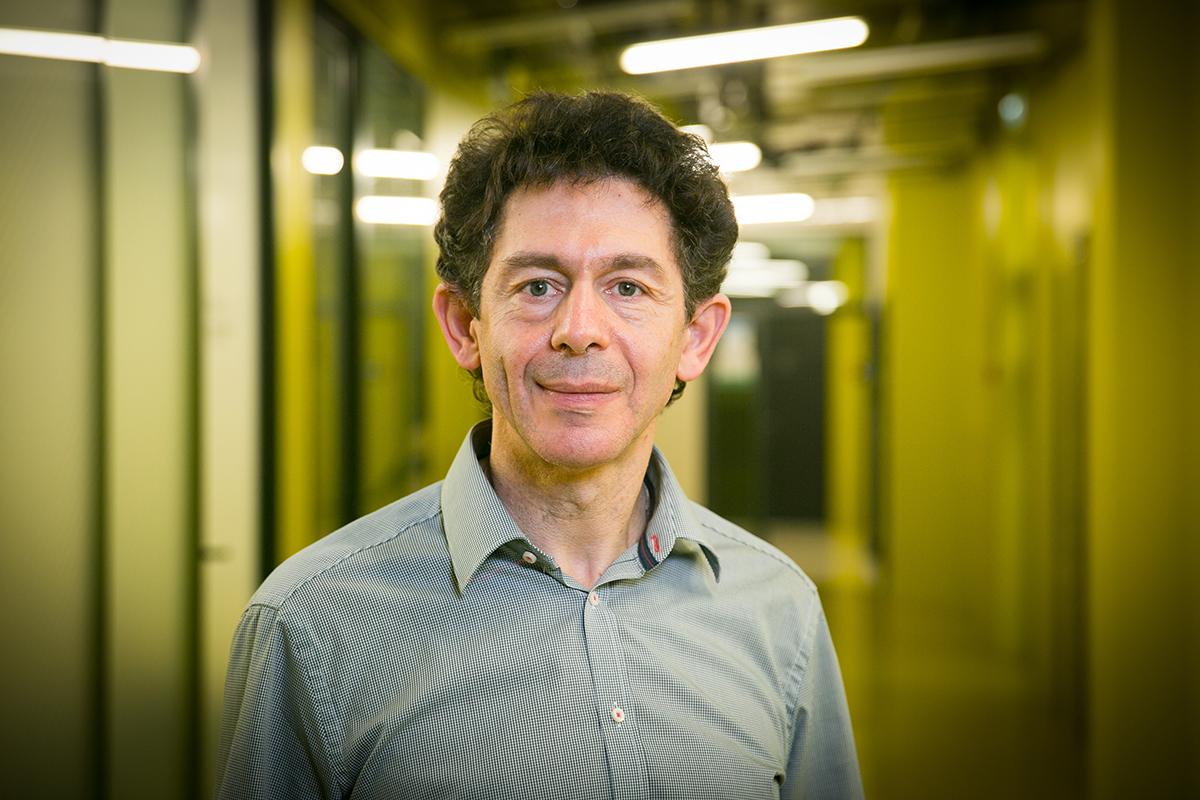‘Our Programme Aims to Make a Research Breakthrough at the Intersection of Mathematics and Computer Science’

In 2017, the HSE Faculty of Computer Science and Skoltech are opening admissions to the Master’s programme in Statistical Learning Theory, which will become the successor to the Mathematical Methods of Optimization and Stochastics programme. Vladimir Spokoiny, the programme’s academic supervisor and professor of mathematics at Humboldt University in Berlin, told us about the research part of the new programme and the opportunities it offers to both Master’s students and undergraduate students alike.
How computers think
If we try to explain what ‘statistical learning theory’ means in common language, it is about teaching computers to think. We want to understand how a human brain thinks and how this can be used in computers. There are already computers that can talk to people, play chess with them; they can do a lot, but we haven’t yet understood the scientific foundation of ‘thinking’. There are some algorithms, but they are based on ‘precedent training’, which means that a computer’s memory contains a set of situations and relevant solutions. Computers don’t think; they search for closest precedents and reproduce the most relevant solution. This is machine learning. And we are only at the beginning of the path to understanding real thinking. The focus of our programme is to train experts who will be able to travel this path.
The courses selected for the programme cover the main subjects that are needed. While each of these courses isn’t unique in its own right, but the combination of courses we offer is without equal in Russian universities. The scale of the tasks and the research ambitions we are facing are huge. Our programme aims to make a research breakthrough at the intersection of mathematics and computer science, so it’s very intense and research-oriented.
What and how we’ll teach
The style of classes in the programme is determined by the fact that it is not only an educational programme, but also a research and study one. We believe that the Master’s level is the entry level to science. If a student sets academic goals, his or her Master’s thesis should add up to one third or even half of the doctoral thesis. This will be the focus of learning and teaching in our programme.
First, we offer students the opportunity to participate in one or more working groups (research seminars). There, each student determines an area of focus in which they will undertake an initial survey report, followed by solving some tasks at the intersection of cutting-edge research and technology in statistical learning theory.
Many companies, such as Yandex, Google, Microsoft, Bosch, Huawei, and Siemens are very interested in experts who have such a background; they search for them and make very appealing offers
These seminars will also include teamwork because the tasks we are facing are so complicated that they can’t be solved by one person alone. We won’t have situations when a student gets an assignment and then spends several months sitting alone, making calculations, and then shows us the result. We believe that complicated tasks can be solved only in a team where various research areas and competencies are discussed and combined. We aim to create an academic research environment for communication where the best researchers can grow.
Where prospective students can start
At the beginners’ level, we don’t expect our students to know anything beyond the traditional academic curriculum in areas of mathematics and computer science such as functional analysis, probability theory, optimization, and complexity theory. We want to choose applicants who are very well prepared, not specifically for this programme, but in comprehensive sense.
Moreover, we invite undergraduate students to take part in research and study events that are currently being organized by the Mathematical Methods of Optimization and Stochastics programme. We work with second-, third-, and fourth-year students, and prepare them to apply to Master’s programmes. They are full-fledged members of our working groups who carry out research. We are completely transparent; all of our events are announced on our website. Just come and join the work! In addition, we hold conferences, summer and winter schools where undergraduate students can also participate.

Why the programme is English taught
We expect to enrol not only Russian-speaking, but also international students in the programme. But this is not the only reason that we teach our subjects in English. Contemporary science, especially in our fied, is English-speaking, and we aim to attract the world’s leading scholars to participate in the programme.
English skills are a must. Students should be able to communicate to people from other countries freely and productively. Science is international, and the lack of English skills is a serious limitation.
Who students will work with
We are recruiting leading experts from both universities to work as part of the programme, including globally renowned scholars, such as Professor Yurii Nesterov, Professor Denis Belomestny, Professor Dmitry Vetrov, Professor Andrei Sobolevski, Associate Professor Alexey Naumov, Associate Professor Quentin Paris, Skoltech professors Ivan Oseledets, Viktor Lempitsky, Evgeny Burnaev, Yury Maximov, as well several other lecturers. This team is rather young, but has already made some significant research achievements.
In addition, we actively cooperate with the RAS Institute for Information Transmission Problems, as well as with the relevant faculties at Moscow State University and the Moscow Institute of Physics and Technology. We also rely on job contracts with a number of big companies that are interested in our students and graduates. The level of mathematical development that we aim for is not available in the industry, even in research-oriented companies.
What graduates will do
First, we aim to prepare researchers in one of the most dynamic and high-demand fields of mathematics and computer science. I believe that our alumni will have wide opportunities for future academic careers in leading universities and research centres in Russia and globally. At the same time, many companies, such as Yandex, Google, Microsoft, Bosch, Huawei, and Siemens are very interested in experts who have such a background; they search for them and make very appealing offers. I can guarantee that our graduates will have a very wide range of opportunities.
See also:
Start of a Long Journey: Young HSE Scientists Contribute to Learning Theory at COLT 2025
Participation in high-level international events is crucial for the professional development of researchers starting their career in science. It provides an opportunity to exchange ideas, create promising teams, and make important connections. This summer, Denis Ryapolov and Askar Tsyganov, students of the Applied Mathematics and Computer Science programme and staff of the AI and Digital Sciences Institute at the Faculty of Computer Science of HSE University, attended the prestigious international Conference on Learning Theory, COLT 2025, which was held in Lyon, France. In an interview, they shared their experiences and impressions from the trip.
From Neural Networks to Stock Markets: Advancing Computer Science Research at HSE University in Nizhny Novgorod
The International Laboratory of Algorithms and Technologies for Network Analysis (LATNA), established in 2011 at HSE University in Nizhny Novgorod, conducts a wide range of fundamental and applied research, including joint projects with large companies: Sberbank, Yandex, and other leaders of the IT industry. The methods developed by the university's researchers not only enrich science, but also make it possible to improve the work of transport companies and conduct medical and genetic research more successfully. HSE News Service discussed work of the laboratory with its head, Professor Valery Kalyagin.
HSE Team Takes First Place in RuCode Algorithmic Programming Championship
On October 20, 2024, the final round of the RuCode Algorithmic Programming Championship took place, setting a new record in the Russian Book of Records as the ‘Largest Competitive Programming Event.’ The event, held simultaneously across 24 locations, hosted 1,450 participants divided into 500 teams. The overall winner of the senior team division was the M.O.S.C.O.W. team from the HSE Faculty of Computer Science (FCS).
HSE Teachers Awarded Yandex ML Prize
The awards ceremony for the international Yandex ML Prize was held in Moscow. This year, all three winners in the ‘ML Educators’ category were HSE faculty members—Evgeny Sokolov, Associate Professor and Head of the Big Data and Information Retrieval School, Anton Konushin, Associate Professor at the Faculty of Computer Science, and Aleksei Shpilman, Associate Professor at the Department of Informatics at HSE’s St Petersburg School of Physics, Mathematics, and Computer Science.
Researchers at HSE in St Petersburg Develop Superior Machine Learning Model for Determining Text Topics
Topic models are machine learning algorithms designed to analyse large text collections based on their topics. Scientists at HSE Campus in St Petersburg compared five topic models to determine which ones performed better. Two models, including GLDAW developed by the Laboratory for Social and Cognitive Informatics at HSE Campus in St Petersburg, made the lowest number of errors. The paper has been published in PeerJ Computer Science.
HSE and Yandex to Expand Collaboration in Training AI Specialists
Over the next ten years, the partnership between Yandex and the HSE Faculty of Computer Science (FCS) will broaden across three key areas: launching new educational programmes, advancing AI research, and exploring the application of generative neural networks in the educational process. Established by HSE University and Yandex a decade ago, the Faculty of Computer Science has since emerged as a frontrunner in training developers and experts in AI and machine learning, with a total of 3,385 graduates from the faculty over this period.
Two HSE Researchers Receive Yandex ML Prize
Two researchers from the HSE Faculty of Computer Science—Aibek Alanov, Junior Research Fellowat the Centre of Deep Learning and Bayesian Methods, Research Fellow at AIRI; and Pavel Braslavski, Associate Professor, Senior Research Fellow at the Laboratory for Models and Methods of Computational Pragmatics—are among the winners of the 2023Yandex ML Prize (formerly the Ilya Segalovich Award).
Days of Computer Science Held at HSE University
Every spring, HSE University’s Faculty of Computer Science, which this year turns nine years old, traditionally opens its doors and invites everyone to a festival. This time, more than 20 events with over 2,000 registered participants were held between April 8th and 16th as part of the Days of Computer Science.
Light Breezes Improve Moods of Social Media Users
Sergey Smetanin, Research Fellow of the HSE Graduate School of Business, conducted a large-scale analysis to examine the impact of weather conditions on the sentiments expressed by users of the Odnoklassniki (OK) social network. The findings have been published in PeerJ Computer Science. This is the first study of its kind in Russia.
Three HSE Researchers Receive Ilya Segalovich Award
Three researchers of the HSE Faculty of Computer Science are among the winners of the 2022 Ilya Segalovich Award: Research Professor Dmitry Vetrov, Associate Professor Alexey Naumov and doctoral student Sergey Samsonov. The award, established by Yandex in 2019, is aimed at supporting young researchers and the scientific community in the field of IT in Russia, Belarus and Kazakhstan.


